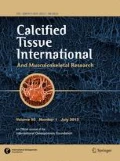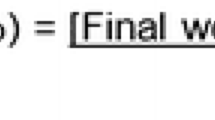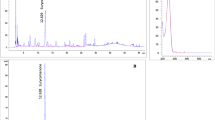Abstract
Bone loss during perimenopause, an estrogen-sufficient period, correlates with elevated serum follicle-stimulating hormone (FSH) and decreased inhibins A and B. Utilizing a recently described ovotoxin-induced animal model of perimenopause characterized by a prolonged estrogen-replete period of elevated FSH, we examined longitudinal changes in bone mineral density (BMD) and their association with FSH. Additionally, serum inhibin levels were assessed to determine whether elevated FSH occurred secondary to decreased ovarian inhibin production and, if so, whether inhibins also correlated with BMD. BMD of the distal femur was assessed using dual-energy X-ray absorptiometry (DXA) over 19 months in Sprague-Dawley rats treated at 1 month with vehicle or 4-vinylcyclohexene diepoxide (VCD, 80 or 160 mg/kg daily). Serum FSH, inhibins A and B, and 17-ß estradiol (E2) were assayed and estrus cyclicity was assessed. VCD caused dose-dependent increases in FSH that exceeded values occurring with natural senescence, hastening the onset and prolonging the duration of persistent estrus, an acyclic but E2-replete period. VCD decreased serum inhibins A and B, which were inversely correlated with FSH (r 2 = 0.30 and 0.12, respectively). In VCD rats, significant decreases in BMD (5–13%) occurred during periods of increased FSH and decreased inhibins, while BMD was unchanged in controls. In skeletally mature rats, FSH (r 2 = 0.13) and inhibin A (r 2 = 0.15) correlated with BMD, while inhibin B and E2 did not. Thus, for the first time, both the hormonal milieu of perimenopause and the association of dynamic perimenopausal changes in FSH and inhibin A with decreased BMD have been reproduced in an animal model.





Similar content being viewed by others
References
Ebeling PR, Atley LM, Guthrie JR, Burger HG, Dennerstein L, Hopper JL, Wark JD (1996) Bone turnover markers and bone density across the menopausal transition. J Clin Endocrinol Metab 81:3366–3371
Bainbridge KE, Sowers MF, Crutchfield M, Lin X, Jannausch M, Harlow SD (2002) Natural history of bone loss over 6 years among premenopausal and early postmenopausal women. Am J Epidemiol 156:410–417
Sowers MR, Finkelstein JS, Ettinger B, Bondarenko I, Neer RM, Cauley JA, Sherman S, Greendale GA, Study of Women’s health across the nation (2003) The association of endogenous hormone concentrations and bone mineral density measures in pre- and perimenopausal women of four ethnic groups: SWAN. Osteoporos Int 14:44–52
Sowers MR, Jannausch M, McConnell D, Little R, Greendale GA, Finkelstein JS, Neer RM, Johnston J, Ettinger B (2006) Hormone predictors of bone mineral density changes during the menopausal transition. J Clin Endocrinol Metab 91:1261–1267
Grewal J, Sowers MR, Randolph JF Jr, Harlow SD, Lin X (2006) Low bone mineral density in the early menopausal transition: role for ovulatory function. J Clin Endocrinol Metab 91:3780–3785
Finkelstein JS, Brockwell SE, Mehta V, Greendale GA, Sowers MR, Ettinger B, Lo JC, Johnston JM, Cauley JA, Danielson ME, Neer RM (2008) Bone mineral density changes during the menopause transition in a multiethnic cohort of women. J Clin Endocrinol Metab 93:861–868
Sowers MR, Zheng H, Jannausch ML, McConnell D, Nan B, Harlow S, Randolph JF Jr (2010) Amount of bone loss in relation to time around the final menstrual period and follicle-stimulating hormone staging of the transmenopause. J Clin Endocrinol Metab 95:2155–2162
Prior JC (2005) Ovarian aging and the perimenopausal transition: the paradox of endogenous ovarian hyperstimulation. Endocrine 26:297–300
Burger HG, Hale GE, Dennerstein L, Robertson DM (2008) Cycle and hormone changes during perimenopause: the key role of ovarian function. Menopause 15:603–612
Sowers MR, Zheng H, McConnell D, Nan B, Harlow S, Randolph JF Jr (2008) Follicle stimulating hormone and its rate of change in defining menopause transition stages. J Clin Endocrinol Metab 93:3958–3964
Robertson DM, Hale GE, Jolley D, Fraser IS, Hughes CL, Burger HG (2008) Interrelationships between ovarian and pituitary hormones in ovulatory menstrual cycles across reproductive age. J Clin Endocrinol Metab 94:138–144
Vural F, Vural B, Yucesoy I, Badur S (2005) Ovarian aging and bone metabolism in menstruating women aged 35–50 years. Maturitas 52:147–153
Perrien DS, Achenbach SJ, Bledsoe SE, Walser B, Suva LJ, Khosla S, Gaddy D (2006) Bone turnover across the menopause transition: correlations with inhibins and follicle-stimulating hormone. J Clin Endocrinol Metab 9:1848–1854
Nicks KM, Perrien DS, Akel NS, Suva LJ, Gaddy D (2009) Regulation of osteoblastogenesis and osteoclastogenesis by the other reproductive hormones, activin and inhibin. Mol Cell Endocrinol 310:11–20
Sun L, Peng Y, Sharrow AC, Iqbal J, Zhang Z, Papachristou DJ, Zaidi S, Zhu LL, Yaroslavskiy BB, Zhou H, Zallone A, Sairam MR, Kumar TR, Bo W, Braun J, Cardoso-Landa L, Schaffler MB, Moonga BS, Blair HC, Zaidi M (2006) FSH directly regulates bone mass. Cell 125:247–260
Sun L, Zhang Z, Zhu LL, Peng Y, Liu X, Li J, Agrawal M, Robinson LJ, Iqbal J, Blair HC, Zaidi M (2010) Further evidence for direct pro-resorptive actions of FSH. Biochem Biophys Res Commun 394:6–11
Ritter V, Thuering B, Saint Mezard P, Luong-Nguyen NH, Seltenmeyer Y, Junker U, Fournier B, Susa M, Morvan F (2008) Follicle-stimulating hormone does not impact male bone mass in vivo or human male osteoclasts in vitro. Calcif Tissue Int 82:383–391
Drake MT, McCready LK, Hoey KA, Atkinson EJ, Khosla S (2010) Effects of suppression of follicle stimulating hormone secretion on bone resorption markers in postmenopausal women. J Clin Endocrinol Metab 95:5063–5068
Ebeling PR (2010) What is the missing hormonal factor controlling menopausal bone resorption? J Clin Endocrinol Metab 95:4864–4866
Nicks KM, Fowler TW, Akel NS, Perrien DS, Suva LJ, Gaddy D (2010) Bone turnover across the menopause transition: the role of gonadal inhibins. Ann N Y Acad Sci 1192:153–160
Iqbal J, Sun L, Zaidi M (2010) FSH and bone 2010: evolving evidence. Eur J Endocrinol 163:173–176
Rouach V, Katzburg S, Koch Y, Stern N, Somjen D (2011) Bone loss in ovariectomized rats: dominant role for estrogen but apparently not for FSH. J Cell Biochem 112:128–137
Allan CM, Kalak R, Dunstan CR, McTavish KJ, Zhou H, Handelsman DJ, Seibel MJ (2010) Follicle-stimulating hormone increases bone mass in female mice. Proc Natl Acad Sci USA 107:22629–22634
Frye JB, Lukefahr AL, Wright LE, Marion SL, Hoyer PB, Funk JL (2012) Modeling perimenopause in Rattus norvegicus (Sprague Dawley) by chemical manipulation of the transition to ovarian failure. Comp Med (in press)
Vom Saal FS, Finch CE, Nelson JF (1994) Natural history and mechanisms of reproductive aging in humans, laboratory rodents, and other selected vertebrates. In: Knobil K, Neill JD (eds) The physiology of reproduction, 2nd edn. Raven Press, New York, pp 1213–1314
Peluso JJ, Steger RW, Huang H, Meites J (1979) Pattern of follicular growth and steroidogenesis in the ovary of aging cycling rats. Exp Aging Res 5:319–333
Huang HH, Meites J (1975) Reproductive capacity of aging female rats. Neuroendocrinology 17:289–295
Butcher RL, Page RD (1981) Role of the aging ovary in cessation of reproduction. In: Schwartz NB, Hunzicker-Dunn M (eds) Dynamics of ovarian function. Raven Press, New York, pp 253–270
Dannaker CJ (1988) Allergic sensitization to a non-bisphenol A epoxy of the cycloaliphatic class. J Occup Med 30:641–643
Haas JR, Christian PJ, Hoyer PB (2007) Effects of impending ovarian failure induced by 4-vinylcyclohexene diepoxide on fertility in C57BL/6 female mice. Comp Med 57:443–449
Mayer LP, Devine PJ, Dyer CA, Hoyer PB (2004) The follicle-deplete mouse ovary produces androgen. Biol Reprod 71:130–138
Wright LE, Christian PJ, Rivera Z, Van Alstine WG, Funk JL, Bouxsein ML, Hoyer PB (2008) Comparison of skeletal effects of ovariectomy versus chemically induced ovarian failure in mice. J Bone Miner Res 23:1296–1303
Chapman SC, Woodruff TK (2003) Betaglycan localization in the female rat pituitary: implications for the regulation of follicle-stimulating hormone by inhibin. Endocrinology 144:5640–5649
Goldman JM, Murr AS, Cooper RL (2007) The rodent estrous cycle: characterization of vaginal cytology and its utility in toxicological studies. Birth Defects Res B 80:84–97
Mayer LP, Pearsall NA, Christian PJ, Devine PJ, Payne CM, McCuskey MK, Marion SL, Sipes IG, Hoyer PB (2002) Long-term effects of ovarian follicular depletion in rats by 4-vinylcyclohexene diepoxide. Reprod Toxicol 16:775–781
LeFevre J, McClintock MK (1988) Reproductive senescence in female rats: a longitudinal study of individual differences in estrous cycles and behavior. Biol Reprod 38:780–789
Iwaniec UT, Samnegård E, Cullen DM, Kimmel DB (2001) Maintenance of cancellous bone in ovariectomized, human parathyroid hormone [hPTH(1–84)]-treated rats by estrogen, risedronate, or reduced hPTH. Bone 29:352–360
Griffin MG, Kimble R, Hopfer W, Pacifici R (1993) Dual-energy X-ray absorptiometry of the rat: accuracy, precision, and measurement of bone loss. J Bone Miner Res 8:795–800
Rabii J, Ganong WF (1976) Responses of plasma “estradiol” and plasma LH to ovariectomy, ovariectomy plus adrenalectomy, and estrogen injection at various ages. Neuroendocrinology 20:270–281
Kalu DN, Liu CC, Salerno E, Hollis B, Echon R, Ray M (1991) Skeletal response of ovariectomized rats to low and high-doses of 17 beta-estradiol. Bone Miner 14:175–187
Shen V, Dempster DW, Birchman R, Xu R, Lindsay R (1993) Loss of cancellous bone mass and connectivity in ovariectomized rats can be restored by combined treatment with parathyroid hormone and estradiol. J Clin Invest 91:2479–2487
Lea CK, Flanagan AM (1998) Physiological plasma levels of androgens reduce bone loss in the ovariectomized rat. Am J Physiol 274:328–335
Zhao H, Tian Z, Hao J, Chen B (2005) Extragonadal aromatization increases with time after ovariectomy in rat. Reprod Biol Endocrinol 3:6
Turner RT, Vandersteenhoven JJ, Bell NH (1987) The effects of ovariectomy and 17b-estradiol on cortical bone histomorphometry in growing rats. J Bone Miner Res 2:115–122
Wronski TJ, Cintrón M, Doherty AL, Dann LM (1988) Estrogen treatment prevents osteopenia and depresses bone turnover in ovariectomized rats. Endocrinology 123:681–686
Kenny HA, Woodruff TK (2006) Follicle size class contributes to distinct secretion patterns of inhibin isoforms during the rat estrous cycle. Endocrinology 147:51–60
Jih MH, Lu JK, Wan YJ, Wu TC (1993) Inhibin subunit gene expression and distribution in the ovaries of immature, young adult, middle-aged, and old female rats. Endocrinology 132:319–326
Wronski TJ, Dann LM, Scott KS, Cintrón M (1989) Long-term effects of ovariectomy and aging on the rat skeleton. Calcif Tissue Int 45:360–366
Stenvers KL, Findlay JK (2010) Inhibins: from reproductive hormones to tumor suppressors. Trends Endocrinol Metab 21:174–180
Reame NE, Lukacs JL, Olton P, Ansbacher R, Padmanabhan V (2007) Differential effects of aging on activin A and its binding protein, follistatin, across the menopause transition. Fertil Steril 88:1003–1005
Acknowledgment
We thank Seymour Reichlin for his insightful contributions to the preparation of this article. This work was supported by grant R21AT003614 (to J. L. F.) from the National Center for Complementary and Alternative Medicine (NCCAM) and the Office of Dietary Supplements (ODS), with partial support by grant ES09246 (to P. B. H.) from the National Institute for Environmental Health Sciences (NIEHS). All work herein is solely the responsibility of the authors and does not necessarily reflect the views of NCCAM, ODS, NIEHS, or the National Institutes of Health.
Author information
Authors and Affiliations
Corresponding author
Additional information
The authors have stated that they have no conflict of interest.
Rights and permissions
About this article
Cite this article
Lukefahr, A.L., Frye, J.B., Wright, L.E. et al. Decreased Bone Mineral Density in Rats Rendered Follicle-Deplete by an Ovotoxic Chemical Correlates with Changes in Follicle-Stimulating Hormone and Inhibin A. Calcif Tissue Int 90, 239–249 (2012). https://doi.org/10.1007/s00223-011-9565-2
Received:
Accepted:
Published:
Issue Date:
DOI: https://doi.org/10.1007/s00223-011-9565-2




